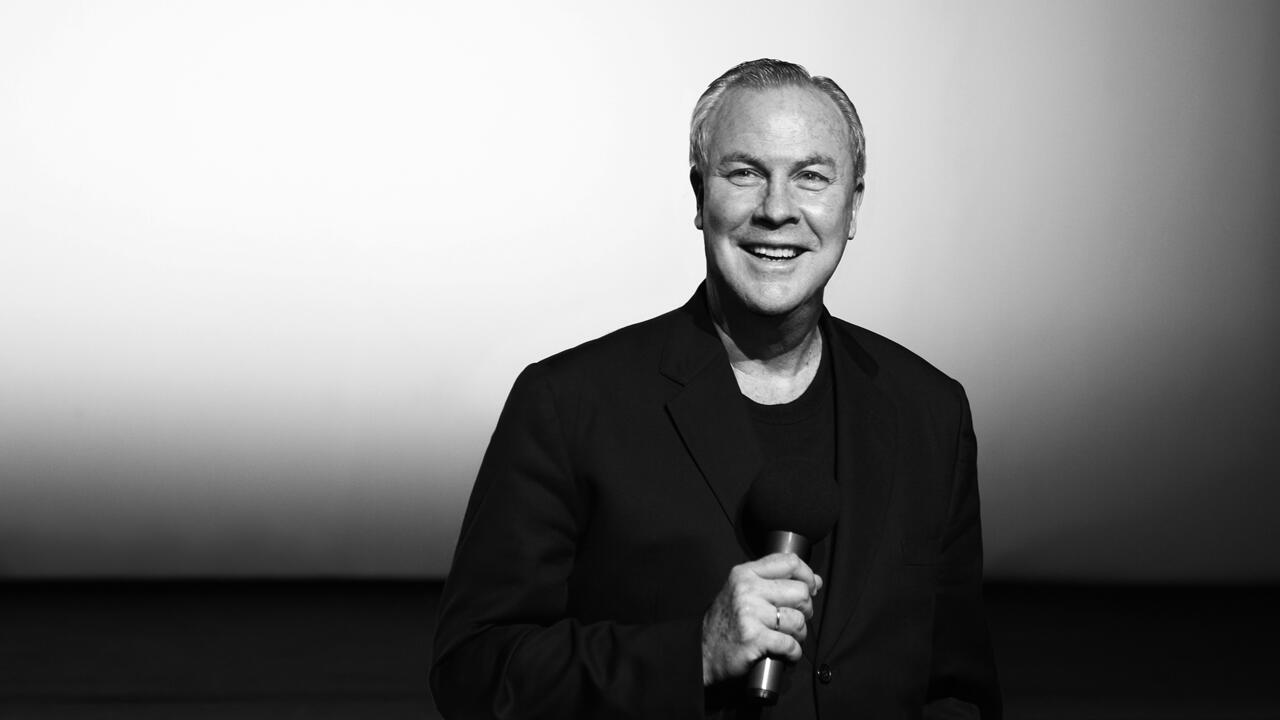Playing Real: The Eerie Prognoses of Rimini Protokoll’s New Robotic Theatrical Production ‘Uncanny Valley’
In their latest production at Munich’s Kammerspiele, the Berlin-based experimental trio give an ‘actroid’ a starring role
In their latest production at Munich’s Kammerspiele, the Berlin-based experimental trio give an ‘actroid’ a starring role

Augmented by an eerie soundtrack of metallophone and glass chimes, a robot occupies the stage of a divided black-box studio. Beside the robot are a table, a laptop from which it appears to operate a video projection and a glass of water that will not be spilled because robots don’t have accidents. The audience is crammed in on the other side, with much budging and squeezing, to marvel at this futuristic setting.
Uncanny Valley, which premiered in Munich last autumn but is touring Europe in May, is conceived and directed by Stefan Kaegi of Rimini Protokoll. The trio, based at Berlin’s Hebbel am Ufer theatre, has long developed a form of documentary theatre that pokes at the perception and structural integrity of reality. For this production, Kaegi has taken the step of inviting an author, playwright and novelist, Thomas Melle, to write the text. Melle is known in Germany for Die Welt im Rücken (The World at My Back, 2016), a confessional novel, shortlisted for the German Book Prize, which examined his experience of bipolar disorder as a state of severance from past and future. In the new work, this split is also a good approximation of what this animatronic doppelgänger represents – a speculative state in which a human present and machine future confront one another.

The robotic replica of Melle, cast from his body, equipped with his voice and accurate to its bitten-down fingernails and rumpled suit, announces itself in a series of hesitations – imitations of human imperfection. The android (or ‘actroid’, as hyper-realistic humanoids like this are known) is joined onstage by a procession of human and humanoid doubles: video projections of the author ‘acting cute’ for the camera as a kid, mugging the role of writer on television and nets, 3D and silicon models made during the production of the replica. We see Melle’s sketches of Alan Turing, the subject of a play Melle could not finish because, we learn, of a manic episode – ‘Frankensteinish’, he calls the drawings.
The performance is a lecture on instability. It takes up the problem of the ‘uncanny valley’, roboticist Masahiro Mori’s term for the cliff-edge of likeability that people perceive in inanimate objects when they appear nearly (though not completely) human. The piece explores Melle’s own experience of bipolarity as a ‘somewhat damaged mechanism’ and his notion of Alan Turing as ‘a tragic computer’. Melle considers instability as the defining human feature, improved upon by the stability of the machine, while the android replica represents a compensatory prosthesis, ‘experienced and newborn at the same time’. The phrase recalls Mori’s belief in what he called the ‘Buddha Nature’ of robots.

Beneath stage lights that glint off metal levers inside its skull – cut away on one side to reveal them – the humanoid figure is transfixing. Elsewhere in the auditorium, the illusion is completed by sightlines, and your brain responds by trying to resolve the difference between the human form and its sometimes machinic movements – like a robot vacuum cleaner that navigates by bumping into things and retracing its steps. The production embraces this freakshow quality, pitching theatre’s empathic voyeurism against the ocular voyeurism that attaches to the robot, which points at the audience, demanding: ‘What did you come here for? To see my body? To identify with me?’ When lights go up at the end of the performance and technicians install security tape, the black box is turned into a white cube and the effect is doubled.

By subtracting live humans as actors, the piece swivels the theatre apparatus 180 degrees and turns it back on the audience. It might be going too far to claim that the robot is really just a clever misdirection, but Uncanny Valley is at least as much interested in the brokenness of human-centred subjectivity and the questions with which this confronts theatre. Melle’s staged struggle to resolve himself into a unified subject is a satirical investigation of its persistence – in psychology as well as theatre – even as science and experience point in other directions.
This May, Uncanny Valley will be performed at the Donaufestival, Krems and FOG Triennale Milano Performing Arts, Munich’s Kammerspiele, Spring Utrecht and Kunstenfestivaldesarts in Brussels.
Uncanny Valley was produced by Munich’s Kammerspiele, in collaboration with the Berliner Festspiele, Donaufestival, Krems, Germany, Feodor Elutine, Moscow, Russia, FOG Triennale Milano Performing Arts, Milan, Italy, Temporada Alta – Festival de Tador de Catalunya, Girona, Spain, and Spring Utrecht, Netherlands.
Main image: Rimini Protokoll, Uncanny Valley, 2019, performance documentation. Courtesy: Rimini Protokoll; photograph: Gabriela Neeb





















